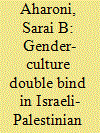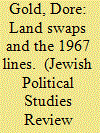| Srl | Item |
| 1 |
ID:
134148


|
|
|
|
|
| Publication |
2014.
|
| Summary/Abstract |
This article investigates structural conditions for women's inclusion/exclusion in peace negotiations by focusing on the linkage between acts of gender stereotyping and cultural framing. Through a narrative analysis of semi-structured interviews with Israeli negotiators and administrators who participated in official negotiations during the Oslo peace process, I link two recent claims about how gender may affect negotiators' understandings of strategic exchange: the gendered devaluation effect and the gender-culture double bind hypothesis. Building upon postcolonial feminist critique, I argue that narratives about women and cultural difference (a) demonstrate and engage with Israeli essentialist and Orientalist discourses about Arab culture and masculinity; (b) manifest how ideas about strategic dialogue and negotiations are gendered; and (c) convey how policymakers and negotiators may use cultural claims to rationalize women's exclusion from diplomatic and strategic dialogue. Furthermore, the study implies that dominant framings of Israeli-Palestinian negotiations as a binary East-West encounter need to be replaced by a more nuanced conceptualization of cultural identity that captures contextual aspects of difference, including the existence of military power and masculine dominance.
|
|
|
|
|
|
|
|
|
|
|
|
|
|
|
|
| 2 |
ID:
126895


|
|
|
|
|
| Publication |
2011.
|
| Summary/Abstract |
It's been weeks since Nobel Laureate Elie Wiesel published his "Jerusalem" open letter addressing US President Obama in full-page adverts in the influential and globally read American newspapers: The Washington Post, The New York Times, The Wall Street Journal, and The International Herald Tribune. Some may wonder why it took me all this time to write a response to the content and purpose of that letter. Many of my friends in London, Washington, New York, Berlin, and even Sydney in Australia, who knew I am ? Jerusalemite, born and raised as a boy who learned the history and meaning of every single stone in the Old City, urged me to respond. The same people were also puzzled by Wiesel's motives in embarking on an expensive advertising campaign when he had dinner with the American president one or two nights before and had conveyed his thoughts and made his request first hand in a face-to-face encounter and, as he claimed, got the impression that President Obama "respected his advice to postpone discussions on Jerusalem" until the end of Israeli-Palestinian negotiations.
|
|
|
|
|
|
|
|
|
|
|
|
|
|
|
|
| 3 |
ID:
127338


|
|
|
|
|
| Publication |
2014.
|
| Summary/Abstract |
When President Barak Obama made his first public reference to the 1967 lines as the basis for future Israeli-Palestinian negotiations on May 19, 2011, he introduced one main caveat: the idea that there would be "mutually agreed swaps" of land between the two sides. He added that both sides were entitled to "secure and recognized borders." But the inclusion of land swaps also raised many questions.
Where did the idea of land swaps come from? True, they have been part of the Israeli discourse among peace process experts for years, but were they legally required? To what extent do land swaps protect Israel's rights to "secure borders" in the event the 1967 lines are used as the territorial basis of a peace settlement?
Several months after Israel captured the West Bank and Gaza in the 1967 Six Day War, the U.N. Security Council defined the territorial terms of a future peace settlement in Resolution 242, which over the decades became the cornerstone for all Arab-Israeli diplomacy. At the time, the Soviets had tried to brand Israel as the aggressor in the war and force on it a full withdrawal, but Resolution 242 made clear that Israel was not expected to withdraw from all the territories that came into its possession, meaning that Israel was not required to withdraw from 100 percent of the West Bank.
|
|
|
|
|
|
|
|
|
|
|
|
|
|
|
|